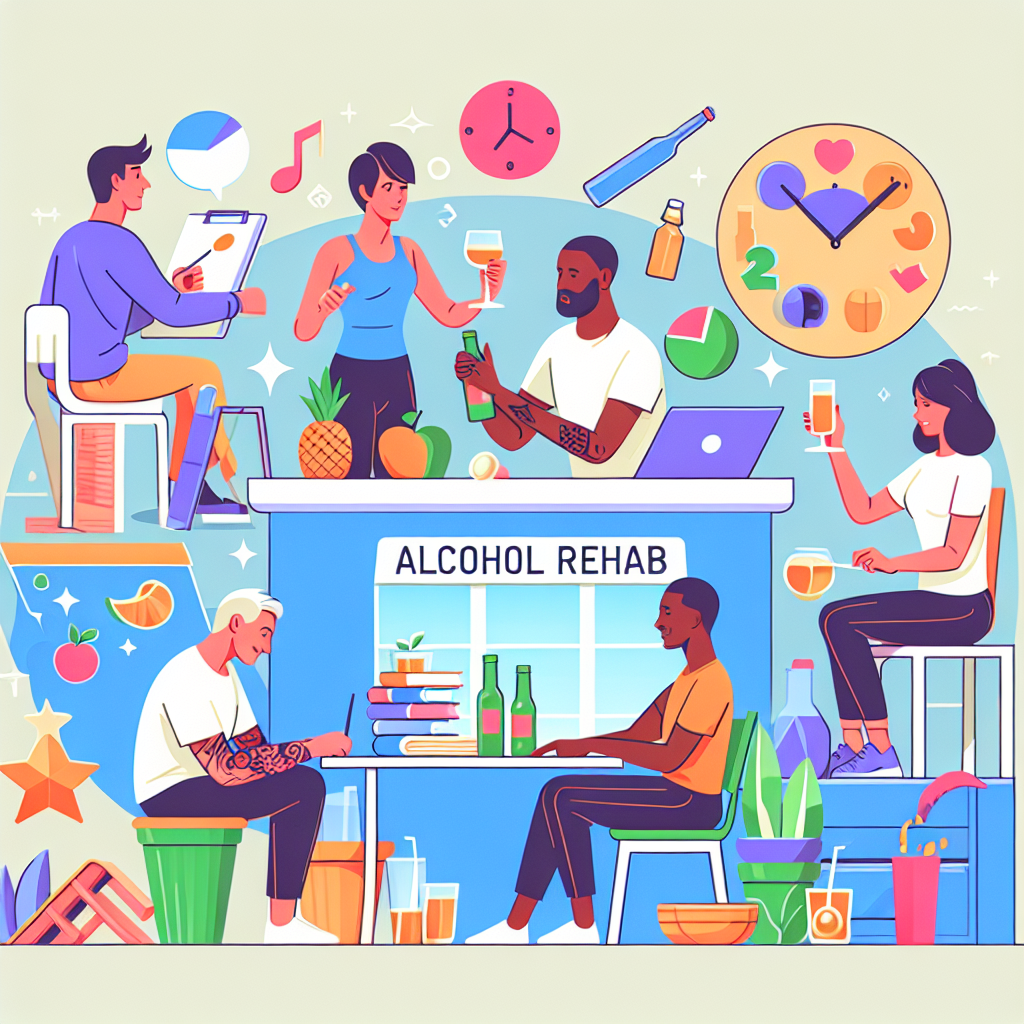-
Table of Contents

“Journey to Recovery: A Day of Healing, Support, and Transformation in Alcohol Rehab”
Introduction
A typical day in alcohol rehab is structured to provide a balanced mix of therapy, education, and activities aimed at promoting recovery and well-being. The day usually begins with a healthy breakfast followed by a morning meeting or group therapy session where individuals can share their experiences and support each other. Mid-morning, participants often engage in individual therapy sessions with a counselor to address personal issues and develop coping strategies. Educational workshops or lectures on addiction and recovery may also be part of the morning schedule.
Afternoons typically include more group therapy, specialized sessions such as cognitive-behavioral therapy (CBT), and activities like exercise, meditation, or art therapy to help manage stress and build new skills. There may also be time allocated for personal reflection or journaling. Evenings often feature additional group meetings, such as 12-step programs, and a communal dinner. The day usually concludes with a wrap-up session or a quiet period for relaxation and reflection, ensuring that participants have time to process their experiences and prepare for the next day. This structured environment is designed to provide comprehensive support and foster a sense of community, which is crucial for long-term recovery.
Daily Routine and Activities in Alcohol Rehab
A typical day in alcohol rehab is structured to provide a balanced mix of therapy, education, and personal time, all aimed at fostering recovery and personal growth. The day often begins early, with a wake-up call around 7:00 AM. This early start is designed to instill a sense of routine and discipline, which can be crucial for individuals who may have experienced chaotic lifestyles due to their addiction. After waking up, residents usually have some time for personal hygiene and to prepare for the day ahead.
Breakfast is typically served around 8:00 AM, offering a nutritious start to the day. Proper nutrition is emphasized in rehab because a healthy body can significantly aid in the recovery process. Following breakfast, the first group therapy session of the day usually takes place. Group therapy is a cornerstone of alcohol rehab programs, providing a supportive environment where individuals can share their experiences, challenges, and successes. This communal aspect helps to build a sense of camaraderie and mutual support among residents.
After the morning group session, there is often a period dedicated to individual therapy. One-on-one sessions with a therapist allow for more personalized attention and the opportunity to delve deeper into personal issues that may be contributing to the addiction. These sessions are crucial for developing coping strategies and setting personal goals for recovery.
Mid-morning might include educational workshops or lectures. These sessions cover a range of topics, from understanding the science of addiction to learning about the importance of mental health and wellness. Education is a powerful tool in rehab, as it empowers individuals with the knowledge they need to understand their addiction and the steps required to overcome it.
Lunch is usually served around noon, providing another opportunity for residents to refuel and relax. Meals in rehab are often communal, fostering a sense of community and shared experience. After lunch, the afternoon might include more group therapy sessions, specialized therapy such as art or music therapy, or physical activities like yoga or exercise classes. Physical activity is encouraged as it helps to reduce stress, improve mood, and promote overall well-being.
In the late afternoon, there may be time allocated for personal reflection or journaling. This quiet time allows individuals to process their thoughts and feelings, which can be an essential part of the healing process. Dinner is typically served around 6:00 PM, followed by an evening group session or a 12-step meeting. These evening sessions provide a chance to reflect on the day, share insights, and prepare mentally for the challenges ahead.
The day usually winds down with some free time, allowing residents to relax, read, or engage in leisure activities. Lights out is generally around 10:00 PM, ensuring that everyone gets enough rest to face the next day with renewed energy and focus.
Throughout the day, the structured routine and variety of activities are designed to address the physical, emotional, and psychological aspects of addiction. This holistic approach helps individuals to rebuild their lives, develop new skills, and gain the confidence needed to maintain sobriety after leaving the rehab facility. The supportive environment, combined with professional guidance and peer support, creates a nurturing space where individuals can begin to heal and envision a brighter, healthier future.
Therapeutic Sessions and Support Systems in Alcohol Rehab
In the journey toward recovery from alcohol addiction, therapeutic sessions and support systems play a pivotal role in alcohol rehab. A typical day in alcohol rehab is meticulously structured to provide a balanced mix of therapy, education, and support, all aimed at fostering a holistic recovery. The day often begins with a sense of community, as residents gather for a morning meeting. This initial gathering sets a positive tone, allowing individuals to share their thoughts, set daily goals, and offer mutual encouragement. It is a time for reflection and motivation, helping everyone to start the day with a clear and focused mind.
Following the morning meeting, the day transitions into various therapeutic sessions. These sessions are the cornerstone of the rehab experience, designed to address the underlying issues of addiction. Individual therapy provides a safe space for residents to explore personal challenges and traumas with a licensed therapist. This one-on-one interaction is crucial for uncovering the root causes of addiction and developing personalized coping strategies. Concurrently, group therapy sessions offer a different yet equally important dynamic. In these sessions, individuals share their experiences and listen to others, fostering a sense of camaraderie and understanding. The shared stories and collective wisdom of the group can be incredibly empowering, reminding each person that they are not alone in their struggles.
As the day progresses, educational workshops and lectures are interspersed with therapeutic activities. These sessions aim to equip residents with knowledge about addiction, its effects on the brain and body, and the importance of maintaining sobriety. Understanding the science behind addiction can demystify the condition and reduce feelings of shame or guilt. Moreover, these educational components often include practical advice on nutrition, exercise, and stress management, all of which are vital for a sustainable recovery.
In addition to formal therapy and education, holistic activities such as yoga, meditation, and art therapy are integrated into the daily schedule. These activities provide alternative ways to process emotions and reduce stress. For instance, yoga and meditation can enhance mindfulness and promote relaxation, while art therapy allows for creative expression and emotional release. These holistic approaches complement traditional therapies, offering a well-rounded recovery experience.
Support systems within the rehab facility are another critical aspect of the daily routine. Peer support is invaluable, as residents often form strong bonds with one another. These relationships provide a network of understanding and encouragement that extends beyond the walls of the rehab center. Additionally, many facilities incorporate family therapy sessions, recognizing that addiction affects not just the individual but also their loved ones. Involving family members in the recovery process can mend strained relationships and build a supportive home environment for when the individual completes their rehab program.
As the day winds down, evening activities often include reflection and relaxation. Residents might participate in a final group meeting to discuss their progress and share any challenges they faced during the day. This closing session reinforces the sense of community and provides an opportunity to celebrate small victories. The day typically ends with some quiet time, allowing individuals to unwind and prepare for restful sleep, which is essential for physical and mental healing.
In summary, a typical day in alcohol rehab is a carefully balanced blend of therapeutic sessions, educational workshops, holistic activities, and robust support systems. Each element is designed to address different facets of addiction and recovery, creating a comprehensive and nurturing environment. Through this structured yet compassionate approach, individuals are empowered to reclaim their lives and build a foundation for lasting sobriety.
Q&A
1. **Question:** What types of therapy sessions are typically included in a day at an alcohol rehab center?
**Answer:** A typical day in alcohol rehab often includes individual therapy, group therapy, and family therapy sessions.
2. **Question:** What other activities might be part of a daily schedule in alcohol rehab?
**Answer:** Other activities may include educational workshops, physical exercise, meditation or mindfulness practices, and recreational activities.
Conclusion
A typical day in alcohol rehab is structured and supportive, designed to help individuals recover from addiction. The day usually begins with a healthy breakfast followed by a morning meeting or group therapy session. Throughout the day, patients participate in various therapeutic activities such as individual counseling, group therapy, educational workshops, and sometimes family therapy. There are also scheduled times for physical exercise, relaxation, and recreational activities. Meals are provided at regular intervals, and evenings often include additional group sessions or 12-step meetings. The structured environment aims to provide a balanced routine that promotes physical, emotional, and mental well-being, helping individuals build the skills and resilience needed for long-term recovery.



